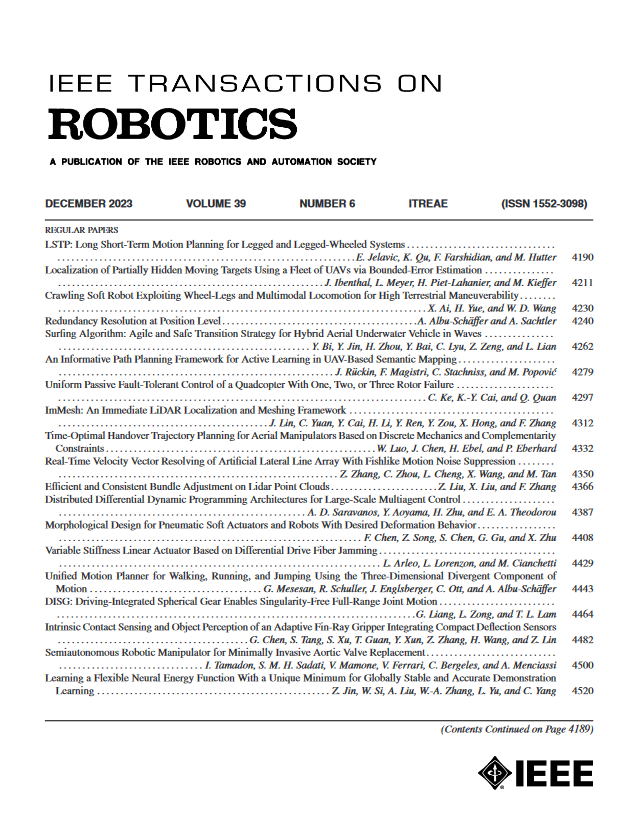Strategic Decision-Making in Multiagent Domains: A Weighted Constrained Potential Dynamic Game Approach
IF 9.4
1区 计算机科学
Q1 ROBOTICS
引用次数: 0
Abstract
In interactive multiagent settings, decision-making and planning are challenging mainly due to the agents' interconnected objectives. Dynamic game theory offers a formal framework for analyzing such intricacies. Yet, solving constrained dynamic games and determining the interaction outcome in the form of generalized Nash equilibria (GNE) pose computational challenges due to the need for solving constrained coupled optimal control problems. In this article, we address this challenge by proposing to leverage the special structure of many real-world multiagent interactions. More specifically, our key idea is to leverage constrained dynamic potential games, which are games for which GNE can be found by solving a single constrained optimal control problem associated with minimizing the potential function. We argue that constrained dynamic potential games can effectively facilitate interactive decision-making in many multiagent interactions. We will identify structures in realistic multiagent interactive scenarios that can be transformed into weighted constrained potential dynamic games (WCPDGs). We will show that the GNE of the resulting WCPDG can be obtained by solving a single constrained optimal control problem. We will demonstrate the effectiveness of the proposed method through various simulation studies and show that we achieve significant improvements in solve time compared to state-of-the-art game solvers. We further provide experimental validation of our proposed method in a navigation setup involving two quadrotors carrying a rigid object while avoiding collisions with two humans.多智能体领域的战略决策:一种加权约束势动态博弈方法
在交互式多智能体环境中,决策和规划具有挑战性,主要是因为智能体的目标相互关联。动态博弈论为分析这种复杂性提供了一个正式的框架。然而,由于需要求解约束耦合最优控制问题,求解约束动态博弈并以广义纳什均衡(GNE)的形式确定交互结果带来了计算挑战。在本文中,我们通过提出利用许多真实世界的多智能体交互的特殊结构来解决这一挑战。更具体地说,我们的关键理念是利用受约束的动态潜能游戏,即通过解决与最小化潜能函数相关的单个约束最优控制问题而找到GNE的游戏。我们认为约束动态势博弈可以有效地促进多智能体交互中的交互式决策。我们将识别现实多智能体交互场景中的结构,这些结构可以转化为加权约束潜在动态博弈(wcpdg)。我们将证明,可以通过求解单个约束最优控制问题来获得所得到的WCPDG的GNE。我们将通过各种模拟研究证明所提出方法的有效性,并表明与最先进的游戏求解器相比,我们在求解时间上取得了显着改进。我们进一步在涉及两个四旋翼飞行器携带刚性物体的导航设置中提供我们提出的方法的实验验证,同时避免与两个人碰撞。
本文章由计算机程序翻译,如有差异,请以英文原文为准。
求助全文
约1分钟内获得全文
求助全文
来源期刊

IEEE Transactions on Robotics
工程技术-机器人学
CiteScore
14.90
自引率
5.10%
发文量
259
审稿时长
6.0 months
期刊介绍:
The IEEE Transactions on Robotics (T-RO) is dedicated to publishing fundamental papers covering all facets of robotics, drawing on interdisciplinary approaches from computer science, control systems, electrical engineering, mathematics, mechanical engineering, and beyond. From industrial applications to service and personal assistants, surgical operations to space, underwater, and remote exploration, robots and intelligent machines play pivotal roles across various domains, including entertainment, safety, search and rescue, military applications, agriculture, and intelligent vehicles.
Special emphasis is placed on intelligent machines and systems designed for unstructured environments, where a significant portion of the environment remains unknown and beyond direct sensing or control.
 求助内容:
求助内容: 应助结果提醒方式:
应助结果提醒方式:


